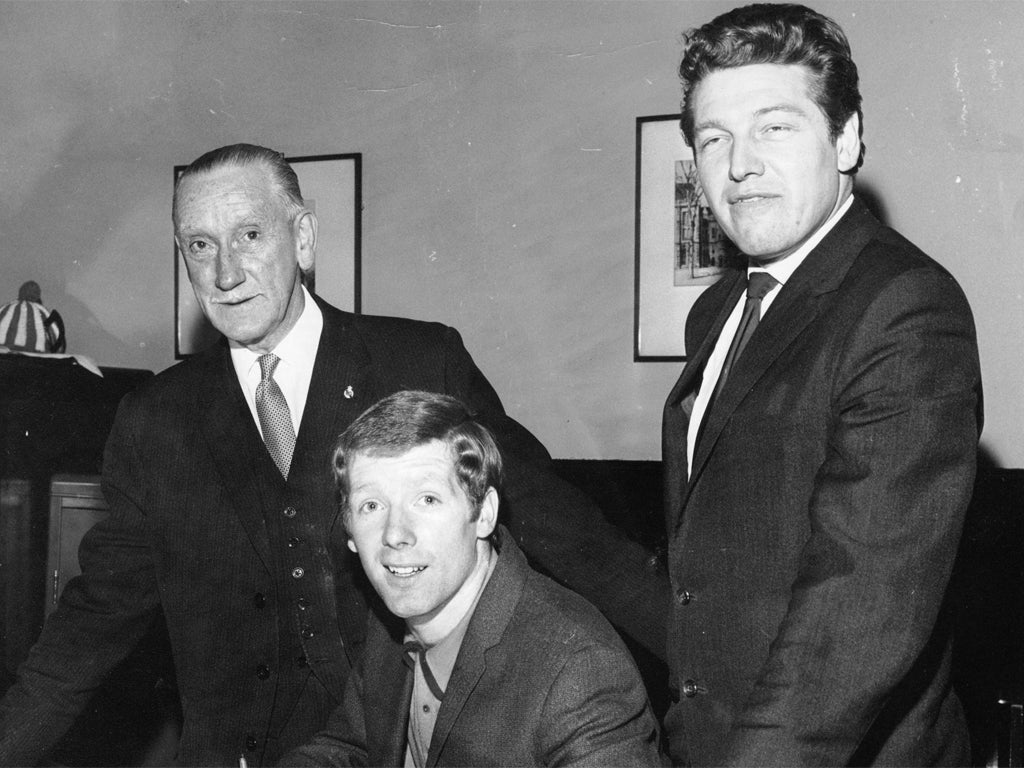Davie White: Rangers boss who struggled to match Jock Stein’s Celtic
At unfashionable Clyde, White had accrued renown as one of the new breed of tracksuit bosses

Davie White was the first Rangers manager not to guide the club to a major trophy, his two-year reign in the late 1960s coinciding with the most triumphant era in the history of their fellow Glaswegians Celtic.
In brilliant and battle-hardened Parkhead boss Jock Stein, the youthful White was up against as formidable an adversary as Scottish football has known – yet still the rookie had to deal with towering expectations and, given his inexperience at that rarified level, it is hardly surprising that he came up short.
It didn’t help that he was pitchforked into his titanic task, rather than groomed for it over several seasons. White’s ascent to the Ibrox hot seat was brought about by the sudden and tawdry dismissal of Scot Symon, who had presided over a sequence of phenomenal success encompassing six League titles, five Scottish Cups, four League Cups and progress to two European finals during his 13-term tenure.
At that point, in November 1967, the 34-year-old had been at Rangers for five months as Symon’s assistant. It was a position he had earned by a single season in charge of unfashionable Clyde, whom he had guided to a hugely creditable third place in the top division and to a Scottish Cup semi-final replay.
White had thus accrued renown as one of the new breed of tracksuit bosses, and he had extended that favourable impression by travelling with both Celtic and Rangers to their respective continental finals in 1967 to garner knowledge, witnessing the Bhoys becoming the first British winners of the European Cup by beating Internazionale of Milan in Lisbon, and Rangers losing the Cup Winners’ Cup by a single goal to Bayern Munich in Nuremberg.
After starting 1967/68 as the rather old-school Symon’s number two, White was handed the top job when his superior was axed – apprised of his fate by an accountant, the board having neither the courtesy nor the courage to sack him in person – even though Rangers were then leading the domestic league table. Symon’s problem was that while Rangers were preparing to face St Johnstone at Muirton Park, Celtic were in Buenos Aires contesting the World Club Championship with a side that would dominate the domestic scene for the foreseeable future. That appeared to be a vivid contrast which the Ibrox directors just could not stomach.
Having inherited a squad containing performers such as John Greig, Willie Henderson, Ronnie McKinnon and Sandy Jardine, White made a wonderful start, his table-toppers winning the first nine games of his regime and remaining unbeaten in the League until the season’s last day, when they lost to Aberdeen. Unfortunately, Celtic were well-nigh unbeatable, too, pipping Rangers to the title by two points.
In Europe, too, they hadn’t done badly, reaching the quarter-finals of the Inter-Cities Fairs Cup before bowing to Leeds United. They went one better in the following term, losing to Newcastle United at the semi-final stage.
Domestically, though – despite buying Colin Stein from Hibernian to replace the previous season’s leading marksman, Alex Ferguson, then adding influential midfielder Alex MacDonald from St Johnstone – Rangers found themselves in their fellow Glaswegians’ slipstream yet again.
Celtic lifting the fourth of nine consecutive championships was bad enough, but also they humbled Rangers 4-0 in the 1969 Scottish Cup final. White blamed Ferguson for allowing Billy McNeill to head an early goal, but that overlooked the folly of expecting the striker to combat a man several inches taller. Ferguson never played for Rangers again and was sold to Falkirk the following November. However, his exit only just preceded that of White, who was sacked after his side lost both legs of a Cup Winners’ Cup tie with Gornik Zabrze of Poland.
White’s critics had a field day, contending that he had been naïve and weak, too compliant with an interfering board, and had been uneasy in his dealings with the press. Even more damning, it was claimed that he had failed to instil discipline or team spirit among his players, some of whom he socialised with.
It was said that his charges got away with sloppiness of appearance and lack of punctuality, particularly Jim Baxter, the former Ibrox hero he had brought back to the club from Nottingham Forest at the outset of 1969/70, but whose return proved a damp squib.
In mitigation, White could point to the fact that he had taken over a Rangers side that hadn’t won the title for three years, the club’s longest drought in half a century, and gone agonisingly close to rectifying the situation at his first attempt. Then there was the need to cope with complex Ibrox politics – and finally the little local difficulty of taking on the peerless Jock Stein.
Unbowed, White returned to top-flight management with Dundee in 1972, keeping them in the upper half of the table for several seasons and finally winning a trophy, the 1973/74 League Cup, when the Dark Blues defeated Celtic 1-0 at Hampden Park.
Dundee went down in 1976 and he was dismissed after failing narrowly to lead them back up at the first attempt. As a player in the late 1950s and first half of the 1960s, White had given doughty service to Clyde, scoring 42 goals in 223 outings as an attacking wing-half.
But it would be with Rangers that he would remain most closely associated. He continued to watch them regularly, even after their descent to the Third Division for the 2012/13 campaign.
David White, footballer and manager: born Glasgow 1933; played for Clyde 1957-66; managed Clyde 1966-67, Rangers 1967-69, Dundee 1972-77; died 16 July 2013.
Join our commenting forum
Join thought-provoking conversations, follow other Independent readers and see their replies
Comments
Bookmark popover
Removed from bookmarks